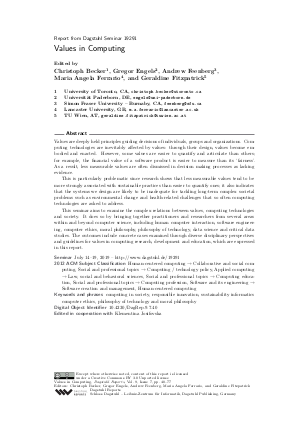Values in Computing (Dagstuhl Seminar 19291)
Authors Christoph Becker, Gregor Engels, Andrew Feenberg, Maria Angela Ferrario, Geraldine Fitzpatrick and all authors of the abstracts in this report
-
Part of:
Issue:
Dagstuhl Reports, Volume 9, Issue 7
Part of: Volume: Dagstuhl Reports, Volume 9
Part of: Journal: Dagstuhl Reports (DagRep) - License:
 Creative Commons Attribution 3.0 Unported license
Creative Commons Attribution 3.0 Unported license
- Publication Date: 2019-12-18
File

PDF
DagRep.9.7.40.pdf
- Filesize: 3.25 MB
- 38 pages
Document Identifiers
Subject Classification
Keywords
- computing in society
- responsible innovation
- sustainability informatics computer ethics
- philosophy of technology and moral philosophy
Metrics
- Access Statistics
-
Total Accesses (updated on a weekly basis)
0Document
0Metadata
Abstract
Values are deeply held principles guiding decisions of individuals, groups and organizations. Computing technologies are inevitably affected by values: through their design, values become embodied and enacted. However, some values are easier to quantify and articulate than others; for example, the financial value of a software product is easier to measure than its `fairness'. As a result, less measurable values are often dismissed in decision making processes as lacking evidence. This is particularly problematic since research shows that less measurable values tend to be more strongly associated with sustainable practices than easier to quantify ones; it also indicates that the systems we design are likely to be inadequate for tackling long-term complex societal problems such as environmental change and health-related challenges that so often computing technologies are asked to address. This seminar aims to examine the complex relations between values, computing technologies and society. It does so by bringing together practitioners and researchers from several areas within and beyond computer science, including human computer interaction, software engineering, computer ethics, moral philosophy, philosophy of technology, data science and critical data studies. The outcomes include concrete cases examined through diverse disciplinary perspectives and guidelines for values in computing research, development and education, which are expressed in this report.
Cite As Get BibTex
Christoph Becker, Gregor Engels, Andrew Feenberg, Maria Angela Ferrario, and Geraldine Fitzpatrick. Values in Computing (Dagstuhl Seminar 19291). In Dagstuhl Reports, Volume 9, Issue 7, pp. 40-77, Schloss Dagstuhl – Leibniz-Zentrum für Informatik (2019)
https://doi.org/10.4230/DagRep.9.7.40
BibTex
@Article{becker_et_al:DagRep.9.7.40,
author = {Becker, Christoph and Engels, Gregor and Feenberg, Andrew and Ferrario, Maria Angela and Fitzpatrick, Geraldine},
title = {{Values in Computing (Dagstuhl Seminar 19291)}},
pages = {40--77},
journal = {Dagstuhl Reports},
ISSN = {2192-5283},
year = {2019},
volume = {9},
number = {7},
editor = {Becker, Christoph and Engels, Gregor and Feenberg, Andrew and Ferrario, Maria Angela and Fitzpatrick, Geraldine},
publisher = {Schloss Dagstuhl -- Leibniz-Zentrum f{\"u}r Informatik},
address = {Dagstuhl, Germany},
URL = {https://drops.dagstuhl.de/entities/document/10.4230/DagRep.9.7.40},
URN = {urn:nbn:de:0030-drops-116358},
doi = {10.4230/DagRep.9.7.40},
annote = {Keywords: computing in society, responsible innovation, sustainability informatics computer ethics, philosophy of technology and moral philosophy}
}
